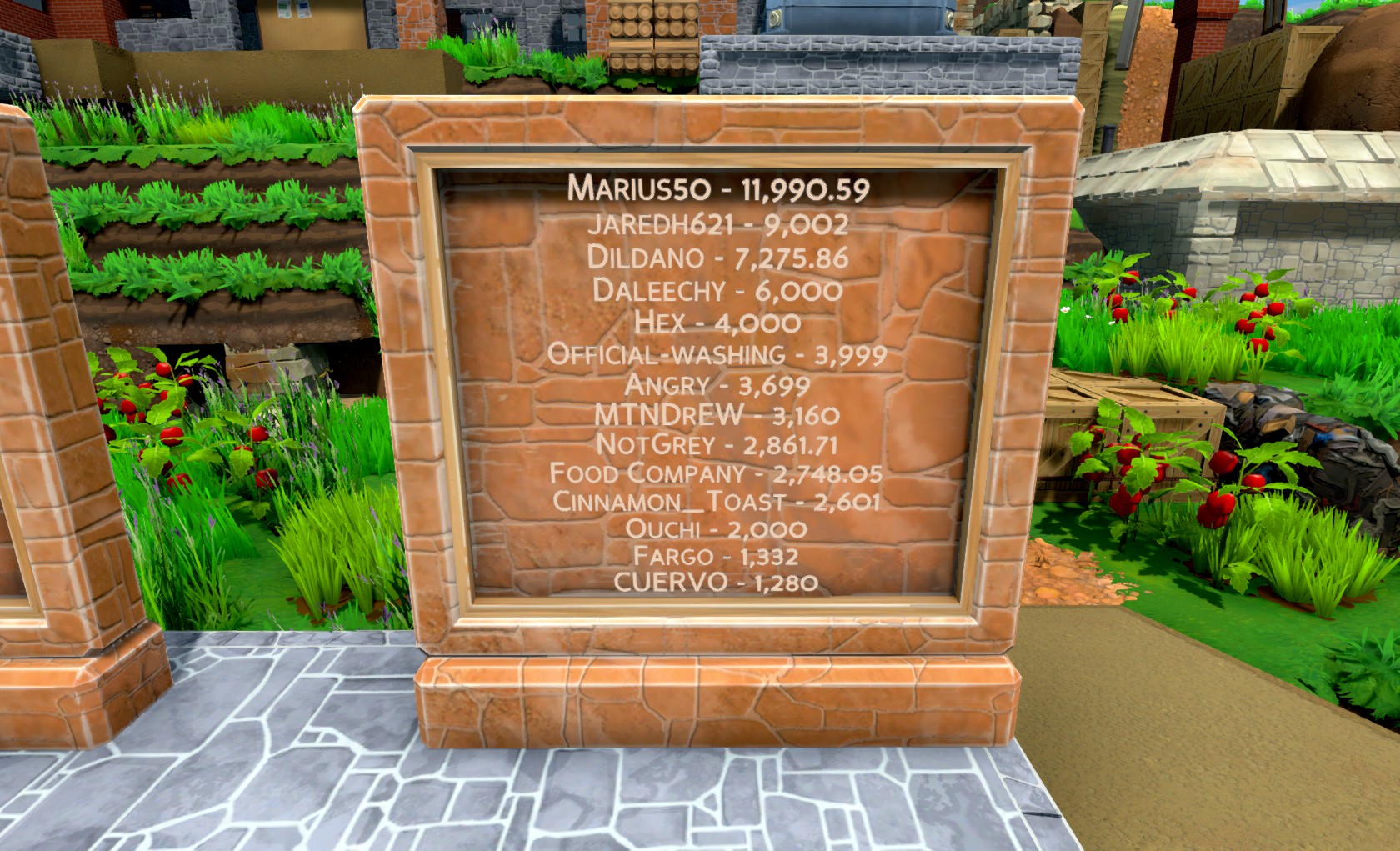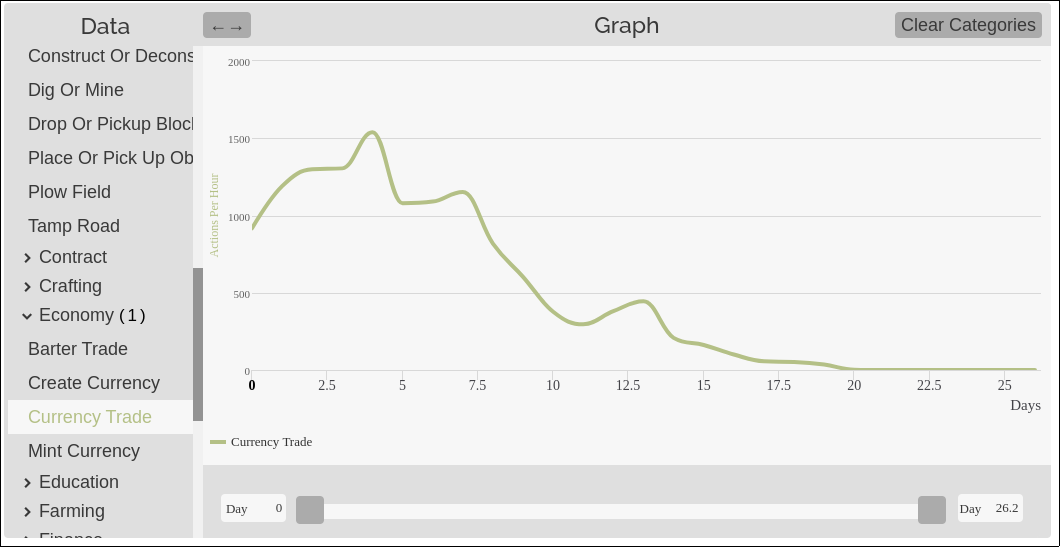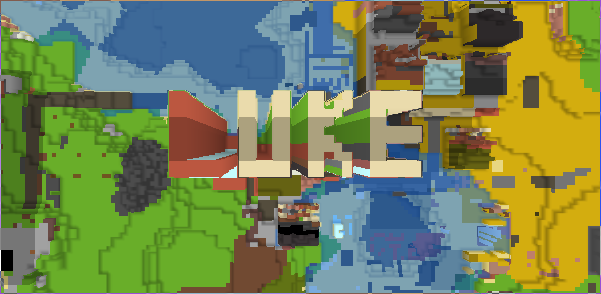The Story of CTU part 3 - Canceling the apocalypse
Today’s story seems appropriate for a July 4th; it starts with the formation of a new government and ends with fireworks.
With a new government established, people could turn their attention to the last challenge: stopping the meteor. We had seven days to do it, and no shortage of challenges. The first one was the famine.
Feeding people is a thankless job
The graphs tell the story better than words. Eco servers generate statistics that can be seen by accessing the server over HTTP. Looking at the Sea Otter server’s graphs, we find a story told of players, justifiably, giving up.
Clarification: This isn’t the only reason people quit—because the game’s servers are public, people will join, get bored, and leave. And, of course, real life intervenes to pull people away. But I still think there’s a bit more of a story here than regular time effects.
So the first graph is barter-trade events. This is where players specifically set their stores to “barter” mode, where there is no currency active and the only way to make a trade is to balance value of goods in with goods out. You can see a small spike around day 1 (when no currency beyond personal credits existed), followed by a highly-unusual spike (when government interference in the money supply collapsed faith in the Crown).

One of the vital jobs in the game is growing food. In addition to being a source of experience points (for eating a balanced diet), players burn through calories while performing tasks and must periodically eat to stay active. Several skills (such as cooking and baking) increase the quality of the food a player can prepare, both in calorie content and in nutritional balance. Without a robust ecosystem of chefs and farmers, players are stuck eating raw gethered foods off the ground, which works but is both space- and time-inefficient.
I don’t have a direct graph for “number of active farmers playing,” but we can use the number of fields plowed as a proxy, because plowed field is used by farmers to grow specific crops. And… It’s not good. Correlated with the currency collapse,there’s a massive spike in cropwork followed by an implosion.

So what happened? It’s only a hypothesis, but here’s my thinking: food preparation is a deep set of skill trees that consumes resources (especially experience points) that could be used for manufacturing. This is fine when the economy is healthy—farmers and chefs sell their goods, they take the money, and they turn around and buy building materials and finished products to upgrade their homes, or hardware to improve care for their fields (like better hoes and plow machines). But with a collapsed economy, where people can only trade in barter (a process that requires enumerating specifically the food items you want to buy and the product you’re willing to sell)… It’s just too much hassle to provide food for everyone. Faced with such a hassle, I think most of our food players quit.
This went hand-in-glove with generally less play, which we can find on the global actions-per-hour graph. You can see on the graph the depression around the economy collapse and then a pickup after, but as part of a generally downward trend of deflating interest in the fate of this server. Again, some of this is definitely the regular pulse of a public Eco server full of strangers, but I suspect the drama of the collapsed currency and government did us no favors; the graph follows the same trend but settles down to the collapse-depressed side of the oscillation.

This wasn’t the end of the world—at least one of them ended up opening their shop to put up every remaining food item at zero cost. And with fewer players remaining active, we had, for better or worse, fewer mouths to feed.
We also had a meteor threatening to wipe us out.

Hey, I’m just going to move some of my stuff in if that’s okay. I mean I’m joining you real soon, I figure no big deal, right?
“Progress faster than science is impossible!”
Angry was our new Minister of Homeworld Defence. They wasted no time establishing a staging point for stopping the meteor, in the form of a giant platform at an intersection between two larger population centers. While our new government was functionally another dictator-vulnerable configuration, the people in charge of it did a much better job of minimizing tyranny, with one possible exception: a law passed by the old government was preserved by the new one, that every player that was not “Active” (i.e. had logged on in the past seven days) had their land deeds revoked. This would allow other players to take advantage of their pre-built resources for new purposes—sensible in a videogame, obvious tyranny in the real world. With that law in place, Angry, Luke, and another player “repurposed” some manufacturing centers southeast of the original capitol into the hardware we’d need to build the anti-meteor laser array.
Because, I assume, this array was responsible for defending our Eco world, this project was dubbed EDF.

While the College didn’t have the skills to participate directly in the manufacturing of the final laser defense system, the mechanics skill I found myself forced to take proved valuable: none of the remaining players had that skill handy, and part of the crafting of the electronics kit required a steady supply of copper wire. So taking advantage of the spare land deeds I’d accumulated, I built a “manufacturing annex” of CTU across the road from the EDF facility and primed the annex to turn copper into copper wire whenever it was provided.

Have truck, will travel
As the remaining players were all working towards the same goal, the “economy”, such as it was, took a bit of a collectivist bent at this point. With so many players gone and so many surplus resources due to the inactive-player-confiscation law, I was gifted a truck to increase convenience of getting around. I also finally gained the last skill point I’d planned for Advanced Masonry, and was gifted an advanced masonry crafting table by Angry and the remaining team.

As well as a really sweet fountain
With the table, I was able to contribute a bit of advanced stonework to the final project, as well as spruce up the manufacturing annex.
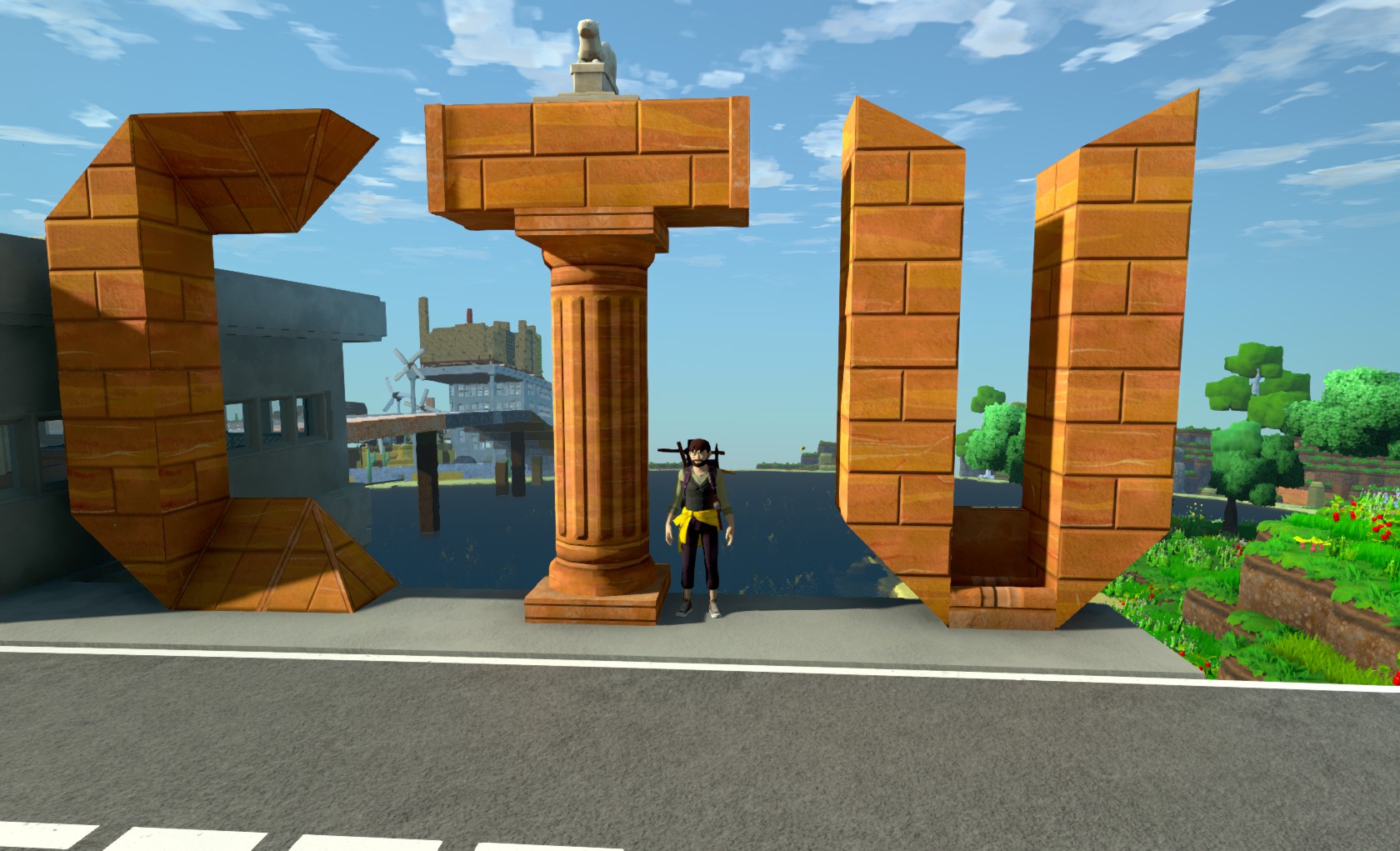
With blood, sweat, and toil, EDF succeeded and the laser defense network was installed.

Bring it down
Finally, the day came to shoot down the meteor. A general announcement was put out, and everyone logged on to see the excitement.
Angry and the EDF team had built an observation dome atop the main EDF building but, roleplaying a college dean to the hilt, I had built myself an independent viewing skybox atop the newly-rechristened College Technolgy University annex building.
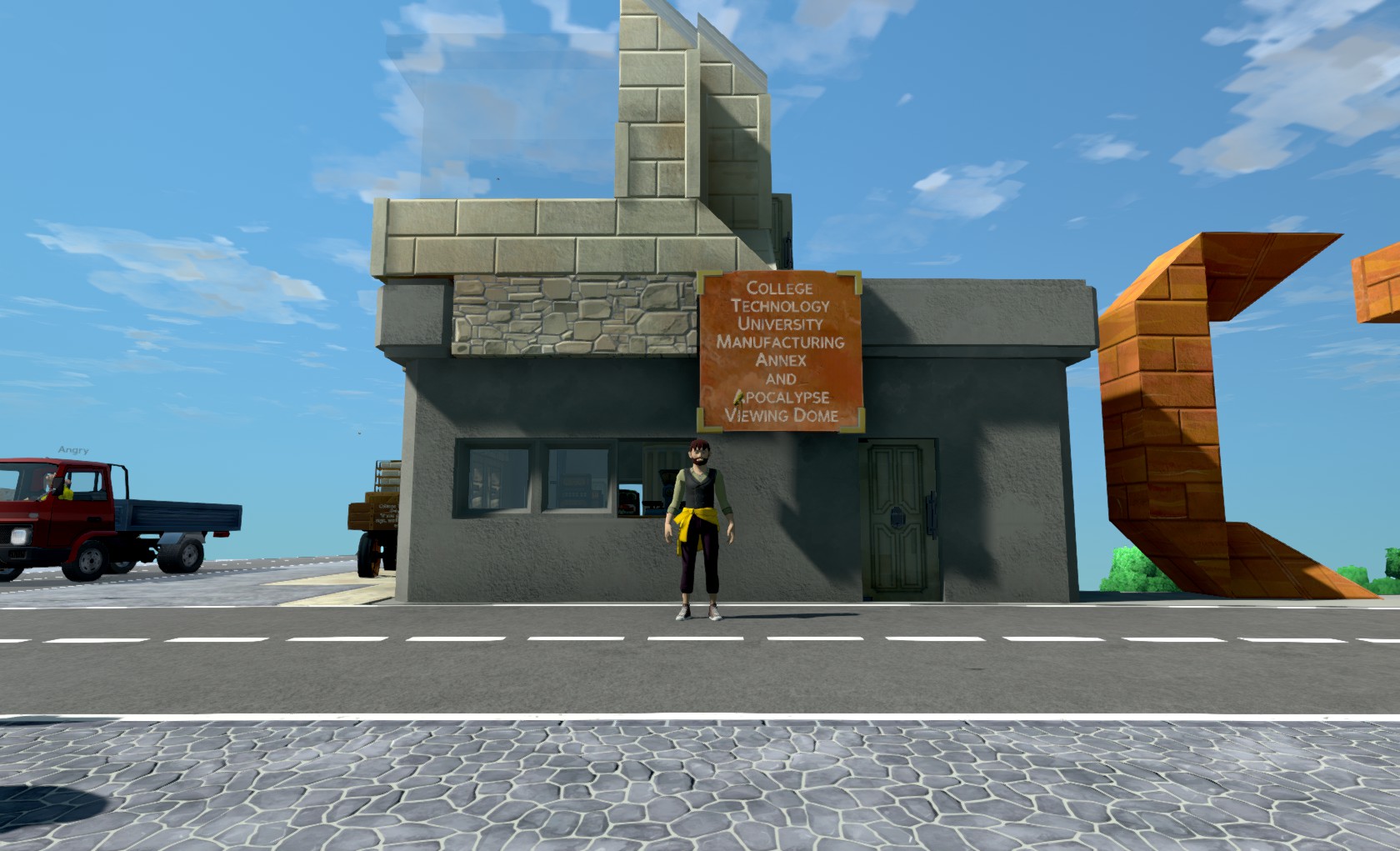
No solicitors.
Finally, the time came. Everyone got situated in their seats, speeches were given, and as the meteor crossed the horizon… The button was pushed.
Mission completed, we all parted ways. I decided to close up shop on the ol’ University. As my final act, I set access for all properties I owned to Everyone, so if anyone had some final use for things they could take advantage of them.
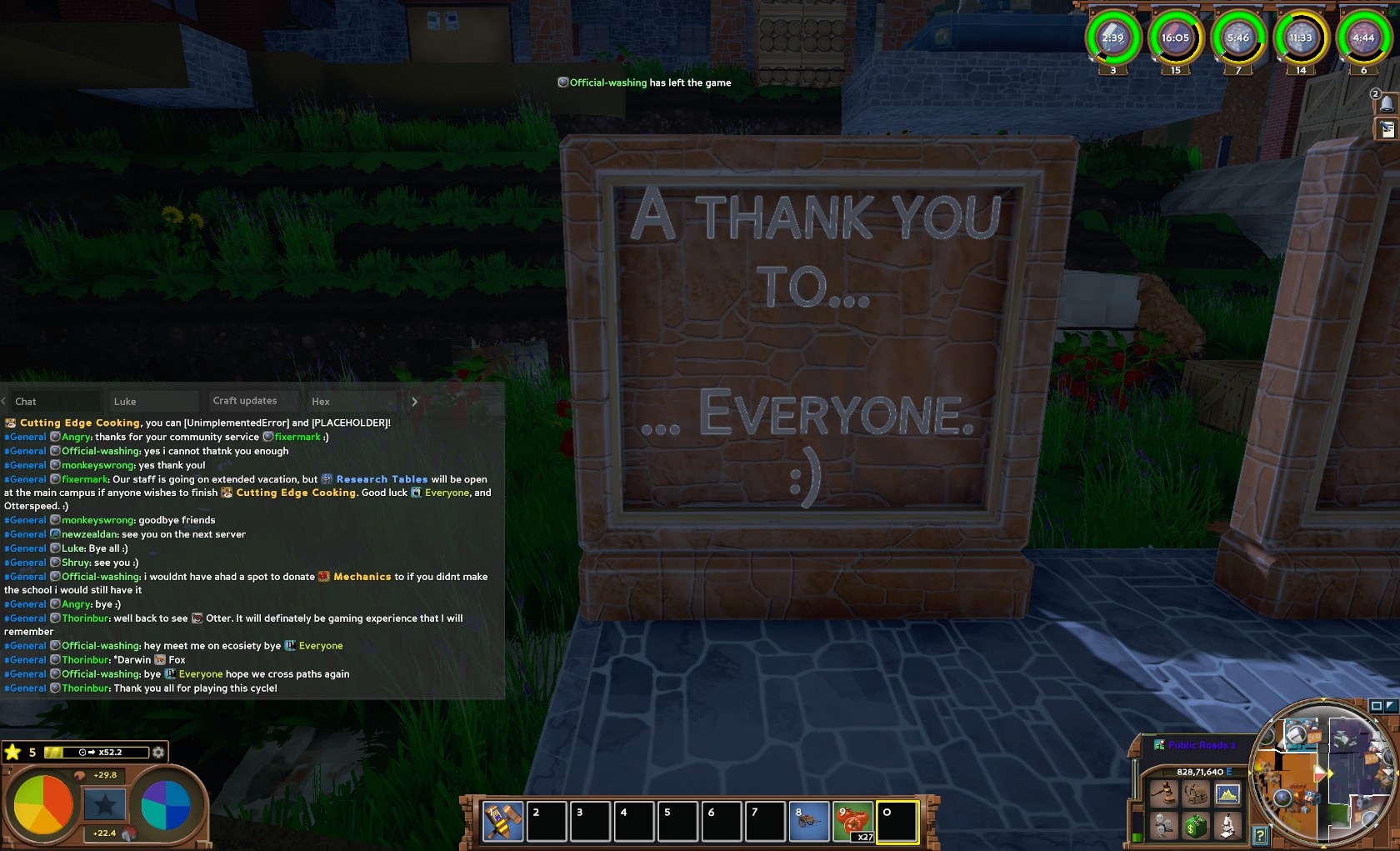
… and changed the donor thank-you sign on the main campus buliding
Final score
So having saved the world, we can get to the Hugh Laurie question: “Does it work?”
Skills researched
In the end, our community unlocked every skill in the game except one. College Technology University, in particular, had a skill book for every unlocked skill in the game except one (Electronics, which had been researched by Luke’s community… I heard rumor they were interested in donation, but our timetables never lined up to pass it my way). The other skill was Cutting-edge Cooking, which is rarely researched because it is (a) the most expensive skill in the game and (b) not actually implemented yet. It appears that it will allow for food additives to be created, but what that will mean if not yet known.
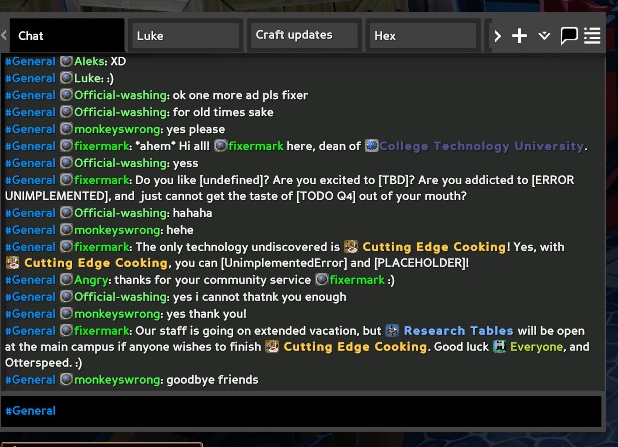
I did make a commercial for it though, just in case
Real estate acquired
Ah, my secret goal, which I only disclosed to a few people.
Those who know American universities are aware, but unis really deal in two resources:
- Knowledge, its creation and propagation, and
- real-estate
Be it an MIT, a CMU, a Stanford, a Harvard… Universities buy land at a prodigious rate, taking advantage of the massive tax benefits offered by most states.
A side-game I was playing with myself was to see how much land CTU could acquire. Since every skill unlocked grants five land deeds for each player who unlocks it, CTU never found itself behind in land; in fact, I often had more land than I could think to use. Part of it went to the creation of the Manufacturing Annex (with an additional part acting as a mining concern west of the desert commuity, for a brief period of time where I traded directly with them seeking advanced masonry materials). But like real universities it seems, I ended up with so much that I found myself using it on vanity projects.
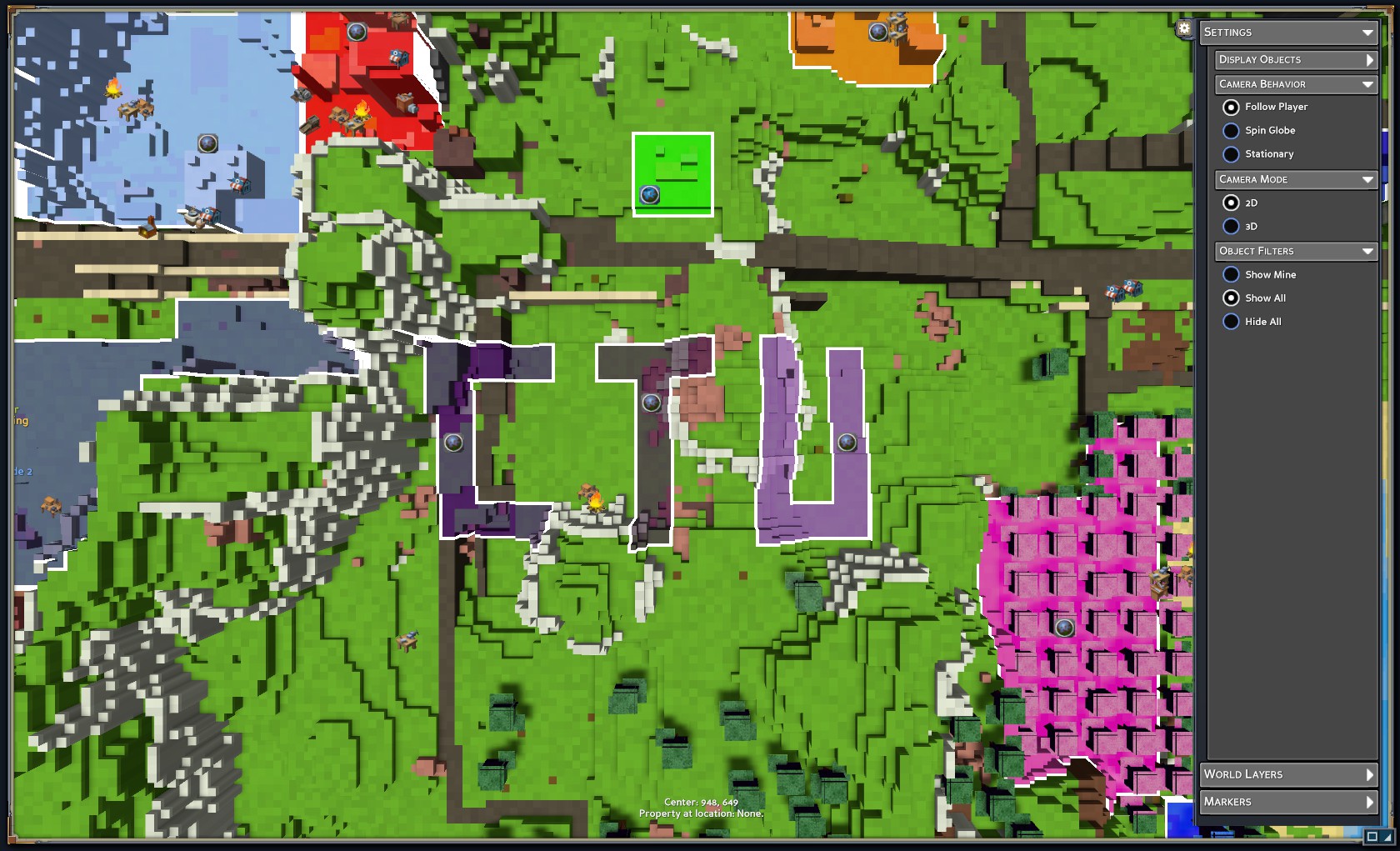
In the end, our land grant rivaled the capitol building’s, and we even bartered a few land deeds during the economic collapse to get key research components.
Keeping up a reputation
While not a primary goal, I realized as the game went on that my player’s reputation had climbed. Each day, each player is able to grant a certain amount of reputation to other players. As a consolidated point of free research, I found myself targeted by massive amounts of unsolicited reputation points. These are not as visible as a public donor board, but they were not unappreciated. Some of these points were also garnered as a side-effect of participating in work groups with other players, lending my labor (in the form of calories spent at their work benches on skills they didn’t have) to build items communally.

“Free To The People”
Did we manage to get skills distributed to players?
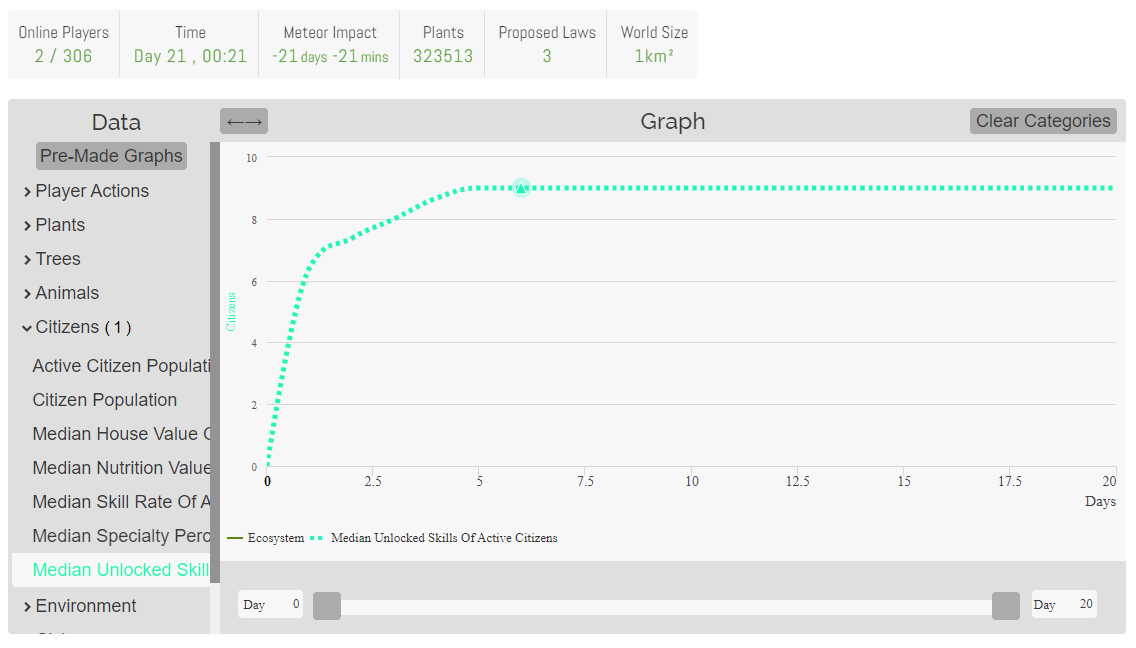
I don’t have direct signal for this question, but I have a couple of proxies. One is the median count of unlocked skills, which hit nine by day 5. Nine skills is a decent number, and given how many players joined and then stopped, I suspect it indicates players were able to access the skills they wanted.

The second graph is the rate of specialties gained by players charted against the rate of work party completion. Work parties were used frequently by CTU (as “visiting lecturer”) to apply skilled work in specializations I didn’t have to research projects; the completion of a work party was often followed by the publication of the corresponding skill book. I think the bumps in specialty gain after work party completion suggest people were accessing the scrolls after they were made available.
Ideas spread
If nature has made any one thing less susceptible, than all others, of exclusive property, it is the action of the thinking power called an Idea; which an individual may exclusively possess as long as he keeps it to himself; but the moment it is divulged, it forces itself into the possession of every one, and the reciever cannot dispossess himself of it. it’s peculiar character too is that no one possesses the less, because every other possesses the whole of it.
~Thomas Jefferson
The most unexpected impact this project had was its impact upon the EDF project. When EDF was set up, it was built out as a donation program to gain the necessary materials and labor to build the laser defense network, control computer, power supply, and housing. I was pleasantly surprised to see, upon entering the main building, how the Minister of Homeworld Defence incentivized participation:

There’s no measure of success quite like one’s approach being adopted by others.
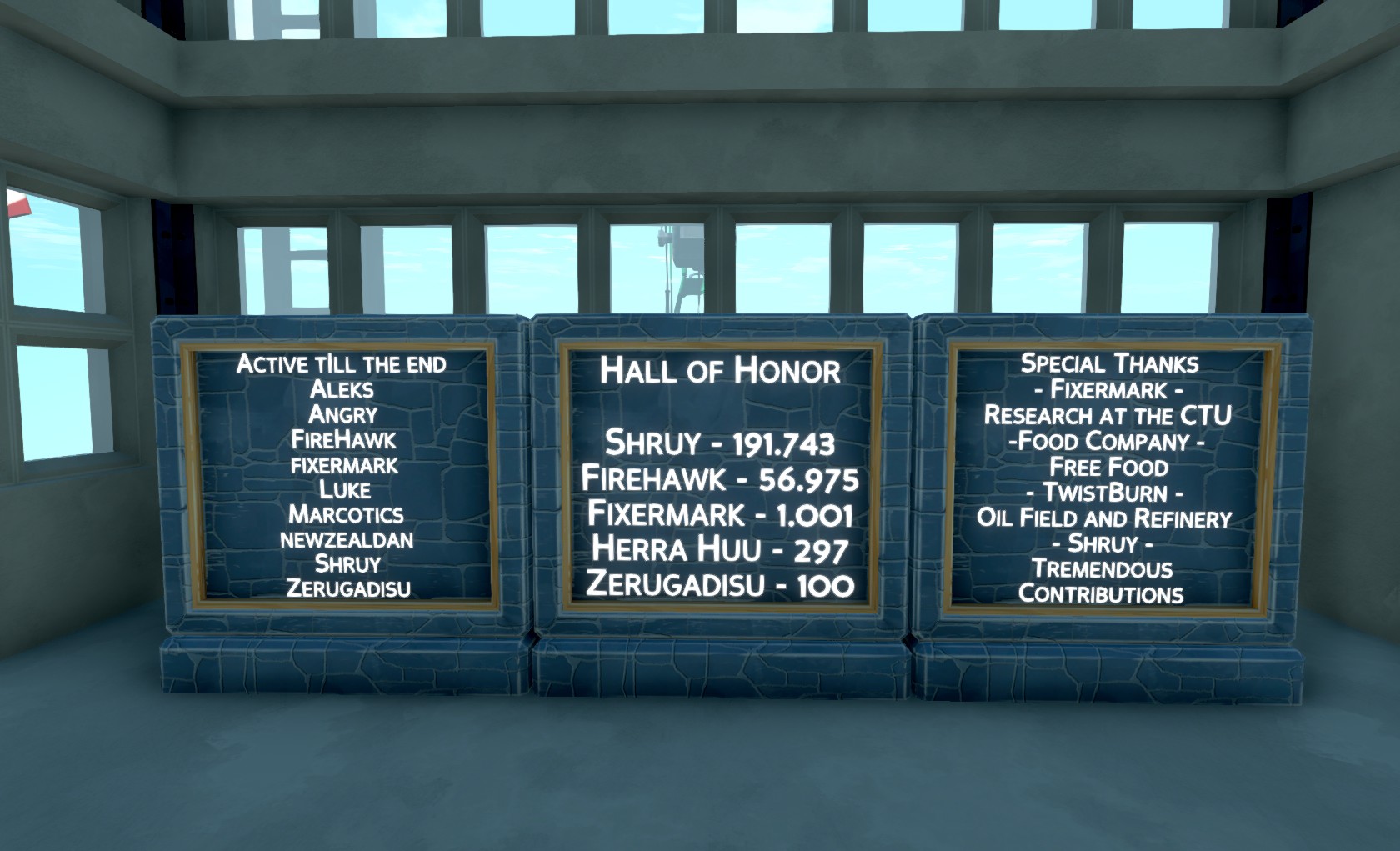
Special Thanks
A special thank you to all the players on Sea Otter for making this adventure possible, to both Luke and Kelvin for organizing players, to Angry for coordinating saving the planet and generous donations of hardware so I didn’t have to carry everything in a hand-cart, to Thorinbur for coordinating the linkage of everything via roads, to our Russian players for being the first ones to build basic engineering (though I had to wander far into the distant mountains to acquire windmills and waterwheels for research purposes, they made it possible!), to the entire Food Company for keeping us fed as long as they did, and to ideas, for spreading.
… and, of course, to the generous patrons of College Technology University. Your donation keeps the knowledge free and the doors open.
